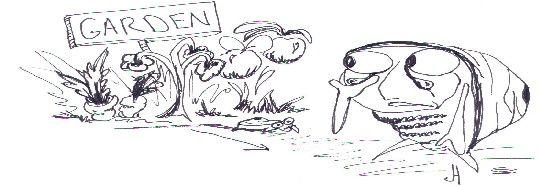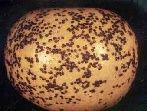Natural Solutions to Things That Bug You (75 page)
Read Natural Solutions to Things That Bug You Online
Authors: Myles Bader
Scales can be removed from the infected plants if the areas where they reside are swabbed with isopropyl alcohol. This application must be repeated on the affected areas every 3-4 days until the scales die.
THE EARLY SPRING SOLUTION
In the early spring before the buds of the plants open, try spraying the plants with a solution of soap and lime, as long as the particular plant will tolerate the spray. Most plant will tolerate this spray very well and it will eliminate the scale problem.
A STICKY WICKET
3 Cups of warm tap water
1 Tablespoon of liquid paper glue
Mix the two items together and place in a sprayer. This will make the plant leaves inedible and the glue will coat the bug’s bodies and suffocate them. The spray will flake off the plant. Do not use a spray-on adhesive from an aerosol can since this will work but is not environmentally safe.
DON’T CRY FOR ME……………
To get rid of scale, just crush up 1 pound of white onions and place them in 3 pints of water then allow it to stand for 24 hours. Strain the mixture and use in a sprayer in areas where you have a scale problem. Test a leaf first to be sure that you will not damage any plants.


GET OUT THE OIL CAN
In the late winter before any new growth starts you will need to spray the plants with horticultural oil spray. This will suffocate any scale that is on the plants.
LADYBUG, LADYBUG WHERE HAVE YOU BEEN……
Ladybugs are one of the best methods of controlling scale.
BLACK SCALE
General Information:
The female is a dark brown or black color and will have ridges on her back that form the letter “H.” It is usually found on twigs or leaves and occasionally fruit. Black scale; can be controlled by using the parasite
Metaphycus helvolus
, which is commercially available. Good identification is a must so call on your local gardening or agricultural supply house to assist you. They prefer citrus and olive trees.
BROWN SCALE
General Information:
These scales will attack avocados and citrus and are soft brown oval scales. They are usually found on leaves and young twigs and will rarely bother the fruit. Heavy infestations will leave honeydew, sooty mold and ants that are attracted to the sweet honeydew.
BEETLES AND PARASITES DO THE JOB
The parasite
Metaphycus luteolus
and the lady beetle
Chilcorus cacti
will make short work of this brown scale.
CALIFORNIA RED SCALE

General Information:
This is an armored scale with no visible egg stage. Crawlers are usually light yellow and the adult is a tiny yellow-winged bug. It is almost always found on fruit and fruit should be inspected at regular intervals.
PARASITES AND PREDATORS
There are a number of parasites and predators that will easily take care of any California Red Scale problem. These include the wasps
Aphytis melinus, Aphytis lingnanensis, Encarsia perniciosi
and
Comperiella bifasciata
. The predators are the small black ladybeetle
Lindorus lophanthae
.
CITRICOLA SCALE
General Information:
This scale can produce honeydew, which will cause a sooty mold to grow on fruit and plants. Specific parasites are very effective and it is best to check with your garden supply store. They prefer citrus, walnuts and pomegranate and luckily only produce one generation each year. The parasites
Metaphycus luteolus
and
Metaphycus helvolus
should take care of the pests.
COTTONY CUSHION SCALE
General Information:
This scale prefers citrus trees and excretes a large amount of honeydew, which pleases the ants to no end. They will be found mainly on twigs and leaves and rarely on the fruit. The nymphs are red and have black legs and antennae. The females lay a cottony-looking egg sac, which will remain attached to their bodies.
NATURAL ENEMIES TO THE RESCUE
The natural enemies include the vedelia beetle and the parasite fly
Cryptochetum iceryae
. The beetle will usually be hanging around if you have any cottony cushion scale in the area.
PURPLE SCALE
General Information:
This scale is found on leaves, twigs and some fruit. The scale produces a toxic substance that can kill the more heavily infested areas of trees and plants. You will easily be able to spot the dead areas. The female has an oyster shell shape that is purple.
OYSTERSHELL SCALE
General Information:
This armored scale attacks most fruit and nut trees and is shaped like a mussel or oystershell. It only feeds on bark and will leave the leaves and fruit alone.
It will be more of a pest if the fruit trees are located near a poplar, willow or walnut tree, which are the preferred host trees. Dormant sprays are not affective since it winters in the egg stage and is protected by the old female covers. It is best to locate the scale and prune the limbs or twigs.
RED SCALE
General Information:
Found on twigs, leaves and fruit and will produce a toxic substance that will kill the leaves, twigs and fruit it inhabits.
The scale is reddish-brown and round. If it is found on green fruit is will appear as a yellow spot that will go through to both sides of leaves. Most chalcid wasps will eliminate this pest.
SAN JOSE SCALE
General Information:
This scale attacks most fruit and nut trees. The adults are gray-brown with a tiny white bump in the center of their bodies.
These scales should be found during the dormant season and destroyed. They will be found on the top of trees as well as the limbs and twigs.
ELIMINATING THE PROBLEM
Pheromone traps work very well on this scale as well as releasing a natural enemy the twice-stabbed lady beetle
Chilocorus orbus
.
WALNUT SCALE
General Information:
This is an armored scale that lays tiny eggs all together on a chain. They hatch into yellow worms within 3-4 days. The adult males are very small yellow-winged bugs. This bug will blend in very well with tree bark and are hard to locate. It is best to spray supreme or superior-type oil: at the end of the dormant season to control the walnut scale.
WASP FOR CONTROL
The tiny parasitic wasp called
Aphytis melinus
;
does an excellent job of locating and destroying the walnut scale.
SCALES FOUND IN ORCHARDS
SCALE PRINCIPAL HOST
Brown Soft Scale………………………… Citrus, avocado, stone fruit
Calico Scale……………………………… Walnuts, pear, stone fruit
California Red Scale…………………….. Citrus, grape & olive
Citricola Scale……………………………. Citrus & walnuts
Cottony Cushion Scale………………….. Citrus, other trees
European Fruit Lecanium……………….. Walnuts & almonds
pears , grapes
Frosted Scale…………………………….. Walnuts
Italian Pear Scale………………………… Walnuts, apples, pears
Olive Scale……………………………….. Olive trees, almond trees
Oystershell Scale………………………… Apples, nuts & pears
Purple Scale ………………………………Citrus
San Jose Scale…………………………… Fruit & nut trees
Soft Scale…………………………………. Citrus, olives, nut trees, fig, apple, pear
Walnut Scale …………………………….. Walnut trees
SCORPIONS

HIRE A CHICKEN
Chickens like to dine on scorpions and will hunt them out. However, I don’t think you want a bunch of chickens walking through the living room so best to let them remove the scorpions that are outside.
